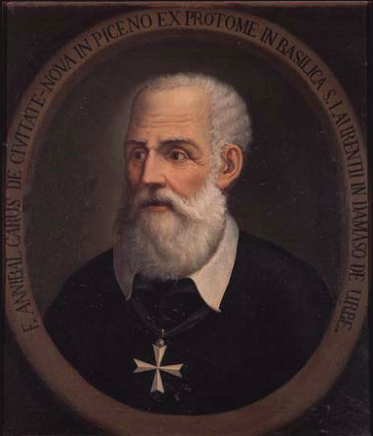
03 Jun Caro Annibal Caro
THE TRANSLATION AWARD in the name of Annibal Caro:
READING, READERS AND THE CITY
Annibal Caro was born in Civitanova on 6 June 1507. He was a translator, poet, numismatist and playwright as carefully reported by Wikipedia and also this year, right on his birthday, here in his hometown the Translation Award in his name will be assigned.
The theatre in Civitanova Alta has his name but for me the translation award dedicated to him, is a precious jewel that makes my heart shine and beat faster.
I come from a linguistic background and translation is a great love of mine.
I am perfectly aware that it is one of those invisible professions, especially when it is well done, and is not adequately recognized even in the professional field.
I firmly believe that words are important, often crucial and who better than a translator who makes the text travel from one language to another, who literally transports it and transposes it, knows and recognizes their value?
It is not just a question of words, but translating a text, especially a literary text, is a work of transposing a whole thought, a culture, a world and an entire universe.
Often we do not think about it, but translators give us the chance to land in worlds that would be inaccessible, they give us the key to visit unknown universes and the fact that the city where I live in has a translation award, in the name of Annibal Caro, who tried his hand at among other things in the translation of the Aeneid, it fills me with pride.
There is another wonderful initiative, also organized by the Annibal Caro Prize for translation, which is growing year by year: the “popular jury” of readers.
Do you like reading? Well, if you want you can participate and be one of the jurors.
Registration is by mid-January, one title at a time is revealed, there are about 40 days to complete the reading and the possibility of buying the titles at a discounted price, in affiliated bookstores, for those who are part of the jury.
It does not matter if you are geographically located here in the area, the love of reading and the desire to embark on the journey that the pages of a book offer you are enough.
For me it was a truly precious experience that managed to combine the intimate and solitary pleasure of reading with other readers through exchanges on the Facebook group.
I had the chance to read some titles that I would hardly have chosen by myself, the other readers offered me interesting food for thought, points of view different from mine and in some cases they provided me with fundamental information on the historical context in which the work was born.
Since 2019 it is the popular jury that decides the winner, taking over from the technical committee that reports only the three finalist titles.
The technical committee is made up of translators (the winner of the previous year enters by right to be part of it), critics, writers.
The promoting committee, to which my very personal and sincere special thanks goes to, is composed by: Rosetta Martellini (who conceived the award), Maria Grazia Baiocco (Latin and Greek teacher at the Da Vinci high school in Civitanova Marche), Lorella Quintabà ( English teacher at Da Vinci high school), Anna Maria Domenella (English teacher in middle school), Antonio Prenna and Federica Alessandri (translator).
The very fact of promoting an initiative that encourages reading and offers the chance to reflect on the role of the translator is an important step in the life of every reader.
For me it was also an opportunity to learn more about Annibal Caro, whom I have seen many times painted on the walls or mentioned in some inscriptions.
The knowledge of a territory also passes through the people who have inhabited it and live there, through their passions, their actions, through the memory that is important to keep alive and pulsating.
The finalists for Premio Annibal Caro 2024:
Barbara Teresi for “La Casa dei Notabili” by Amiea Ghenim – Edizioni e/o
Tommaso Pincio for “Cassa 19” by Claire- Louise Bennet – Bompiani
Maurizia Balmelli for “Il Passeggero” by Cormac McCarthy – Einaudi
The finalists for Premio Annibal Caro 2023:
Nicola Verderame for “Pietra e Ombra” by Burhan Sönmez ed. Nottetempo
Riccardo Durastanti for “Oltremare” by Paul Lynch ed. 66th and 2nd
Ileana Zagaglia for “Alla Linea” by Joseph Ponthus ed. Bompiani
The finalists for Premio Annibal Caro 2022:
Gaja Cenciarelli for “Un brav’uomo è diffcile da trovare” by Flannery O’Connor ed. Minimum Fax
Anna Mioni for “Mare Aperto” by Caleb Azuman Nelson ed. Blu Atlantide
Marco Rossari for “Come Governare il Mondo” by Tibor Fischer ed. Marcos y Marcos
The finalists of the Annibal Caro Award 2021:
Daniele Petruccioli for “Eliete” by Dulce Maria Cardoso (winner of the readers’ jury prize)
Claudia Durastanti for “Exciting Times” by Naoise Dolan
Letizia Kostner for “Love in the Time of Climate Change” by Josef Panek
The finalists of the Annibal Caro Award 2020:
Bruno Mazzoni for “Il Levante” by Mircea Cărtărescu
Scilla Forti for “What you see from here” by Mariana Leky (winner of the readers’ jury prize)
Tommaso Pincio for “Archive of Lost Children” by Valeria Luiselli
The finalists of the Annibal Caro Award 2019:
Bruno Arpaia for “Anni Lenti” by Fernando Aramburu
Silvia Parechi for Dennis Johnson’s “Jesus’ Son”
Luca Fusari for “Bones of the Sun” by Mike McCormack (winner of the readers’ jury prize)
The first edition of the Annibal Caro Prize for translation took place in 2018 as part of the Futura Festival and was articulated in a slightly different way, in the reported link you can find all the information about it if you are curious.
You can follow the Annibal Caro Award on the Facebook page or on Instagram and you can take advantage of some excellent ideas and reading tips and maybe become a juror for the next edition!
Enjoy the reading
♥



No Comments